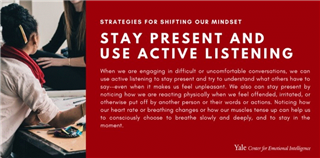HI all,
I've come across the concept of Intolerance of Uncertainty - something my psychologist mentioned and after a recent blip I've started investigating it. Most of the material I've come across is academic papers (taking a wee bit of time to absorb) but I was wondering if anyone else had come across the idea and what they made of it?
On a semi-related topic the Coursera platform is running a course by the Yale Centre of Emotional Intelligence: Managing Emotions in Times of Uncertainty and Stress. It's free (although you can pay £36 for a certificate if you want one). Link > https://www.coursera.org/learn/managing-emotions-uncertainty-stress
It's intended for school staff (and neurotypicals) but looking at the syllabus I'm fairly sure there's ideas that might give me another perspective and increase emotional awareness. I'm going to explore it - but I thought I'd share in case anyone else is interested.
The course leader Marc Brackett has a website @ https://www.marcbrackett.com/ (apologies for the big book ad slap bang in the middle of the homepage - I'm not on commission, It's the video I'm pointing to)



